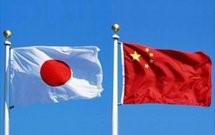 BEIJING (AFP) - One hundred years after the outbreak of World War I, China and Japan are ripping selected pages from Germany's history -- including the Nazi period -- as they seek to demonise each other in their modern-day diplomatic battles.
BEIJING (AFP) - One hundred years after the outbreak of World War I, China and Japan are ripping selected pages from Germany's history -- including the Nazi period -- as they seek to demonise each other in their modern-day diplomatic battles.
Beijing's state-controlled media have compared Japanese Prime Minister Shinzo Abe to Adolf Hitler, using shrill rhetoric that analysts say exploits Tokyo's mixed messages about its past aggression in China and elsewhere.
At the same time, they urge him to emulate Germany's post-war contrition for the evils of Nazism.
Abe, for his part, has raised the spectre of 1914, saying at the World Economic Forum in Switzerland that relations between Japan and China resemble those of Britain and Germany as they stumbled towards war.
Tokyo and Beijing are locked in an increasingly acrimonious row over small, uninhabited islands in the East China Sea that Japan controls but China regards as its territory, with their militaries warily eyeing each other.
Commentators have likened China, a rising power, to Germany in the early 20th century and portrayed the islands as Sarajevo, site of the assassination of Archduke Franz Ferdinand that triggered the Great War.
In Davos, Abe pointed out that war broke out in 1914 despite strong economic relations between Germany and Britain.
"I think we are in a similar situation. We don't want an inadvertent conflict arising between these two countries," he told reporters.
China's foreign ministry spokesman Qin Gang roundly rejected the simile Thursday. "Actually in history China was already a major country in the Tang and Song dynasties (from the seventh to the 13th centuries), so there is no so-called 'China is becoming a major country'," he said.
"There is no need to make an issue of the Britain-Germany relationship."
'Hitler's DNA'
Chinese officials have lashed out at Abe since his December 26 visit to the hugely controversial Yasukuni shrine, which honours 2.5 million Japanese war dead including 14 senior war criminals described by Qin as "the Nazis of the East".
The shrine is seen in China and South Korea as a symbol of Japan's 20th century military and colonial aggression which saw the country occupy a large swathe of East Asia, often to brutal effect on civilians and prisoners of war.
In what analysts see as crude propaganda, the overseas edition of the Communist Party mouthpiece People's Daily headlined an article "Hitler's DNA in Abe", illustrated with a mock-up of Japan's leader gazing up at the Fuhrer.
The Global Times tabloid, in its English edition, this week carried a cartoon of Japan's national flag with the sun symbol in the centre dripping blood and a swastika imposed.
"You could say it's propaganda," Torsten Weber, an expert in modern East Asian history at the German Institute for Japanese Studies in Tokyo, told AFP.
"It is a way to distort history and it's also a way to distract attention from more pressing problems that, for example, China faces."
Chinese media have also tried to compare Abe unfavourably with how Germany faced up to Nazi atrocities.
The official Xinhua news agency urged him to follow the example of West German chancellor Willy Brandt, who fell to his knees at a monument to victims of the Warsaw Ghetto Uprising -- a brutally crushed 1943 revolt by Jews in the Polish capital facing deportation to the Nazi death camps.
Contrived anger?
But Robert Dujarric, director of the Institute of Contemporary Asian Studies at Temple University Japan in Tokyo, said Beijing had ulterior motives.
Abe's course of action "makes Japan look bad, damages ties between Tokyo and Washington, makes Koreans anti-Japanese and therefore serves Chinese interests", he said.
"Beijing calls on Japanese leaders to act like German leaders because it knows they won't, and therefore uses this analogy to damage Japan's image."
In 1995 Japan's then-prime minister Tomiichi Murayama made a "clear apology" for the country's previous aggression, said Yoshiaki Yoshimi, professor of history at Tokyo's Chuo University.
"Administrations should stand by that statement, but the problem is that Abe is acting as if he does not," he said.
Abe's shrine visit met with as much opprobrium as approval in Japan. However, a minority of Japanese believe Japan's wartime deeds have been vastly exaggerated and emphasise its own suffering, especially through the nuclear bombings of Hiroshima and Nagasaki.
Japanese invasion and occupation undoubtedly inflicted vast sufferings on China -- according to Beijing, 20.6 million died as a direct result including in the Nanjing Massacre, when Japanese troops went on a two-month rampage from December 1937.
But Weber cautioned against equating atrocities such as the Nanjing Massacre with the Nazi genocide against the Jews, saying: "There was no Japanese Holocaust. There was no Japanese Hitler."
He added: "As a German I feel obliged to say that Germany is given too much credit for its assumed positive or effective overcoming of the past."
Courtesy : AFP